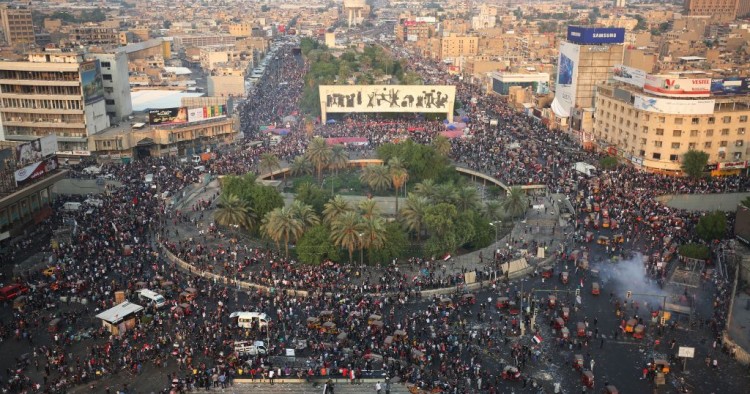On Oct. 25 a second wave of protests in Iraq began, resulting in hundreds of deaths and thousands of injuries. In a televised speech on Oct. 24, Iraqi Prime Minister Adel Abdul-Mahdi pledged that people would be free to exercise their right to protest while warning that violence will not be tolerated. Instead, young Iraqis in the streets of Baghdad and southern provinces were met with bullets, tear gas, and water cannons. University and high school students joined the protests on Oct. 27, followed by religious seminary students in Najaf on Oct. 28.
In his Oct. 24 speech, the prime minister promised to undertake a long list of reform measures to fight corruption, create jobs, and ensure accountability, while also working on a new election law to hold early elections and forming a committee to study constitutional amendments. In terms of the substance, the reforms were good and if implemented, will address some of the protesters’ demands. The problem lies in the fact that the protesters have lost trust and confidence in the ruling class, including the prime minister. The protesters want the government to resign, a new technocratic non-partisan cabinet to be formed to oversee a transitional period that will include holding early elections according to a new election law, the sitting of a new parliament, the election of a new president, and the appointment of a new prime minister. An investigative committee appointed by the prime minister to identify and hold responsible those who shot and killed protesters earlier in October delivered a report which was viewed by Iraqis as insufficient and lacking credibility, especially in holding accountable what most Iraqis and Iraqi officials believe are Iran-linked Iraqi militias that sent unidentified masked snipers to shoot at protesters.
The Council of Representatives convened on Oct. 28 and voted on a series of measures including, among others, the abolition of provincial and local councils (excluding the Kurdistan Regional Government) long viewed by Iraqis as corrupt and a means for political parties to siphon off public funds to subsidize their patronage networks, the cancellation of all bonuses and appropriations for the three presidencies (president, prime minister, and speaker of parliament), along with members of parliament and senior officials, consultants, and directors general in all ministries.
Muqtada al-Sadr, the leader of the largest parliamentary bloc in the Council of Representatives, ordered the members of his bloc to abandon the pro-government coalition and join the opposition camp. He and a few other Iraqi officials, including former Prime Minister Haider al-Abadi, have called for the government to resign.
The protesters are not going to go home. They are emboldened by the spread of the protests to include university and seminary students and high schoolers. Violence will not work except to deepen and protract the crisis of confidence between the Iraqi street and the government. Only one leader has the moral standing and mass appeal to be able to move Iraq out of the deadly stalemate in which it now finds itself and which may degenerate into more violence and chaos if the status quo is not upended: Grand Ayatollah Ali al-Sistani. In his sermon last Friday, he called on the protesters to refrain from using violence against the security forces and ransacking public property. He said the results of the investigation of the violence carried out in the previous wave of protests were not satisfactory. But to date he has not called on the government to resign. It is unlikely that the wise man of Najaf will do so openly. But as he has often done since 2003 when he chose to intervene at critical junctures to end stalemates and crises that threatened to undo the post-2003 political order — an order which he has striven time and again to support — he might once again back an effort to unseat the government. The problem he and the ruling class face is that the protesters, the great majority of whom are Shi’a, are rebelling against the whole political order and not just against people in government right now. They want to move the country away from the sect-based power sharing system which has enabled sectarian political parties to leverage their political power to enrich their leaders and subsidize their patronage networks. The conundrum facing Najaf is that this is the same political order which Grand Ayatollah Sistani has striven to protect since it was put in place following the U.S. invasion of Iraq in 2003.
Randa Slim is a Senior Fellow and the Director of MEI’s Conflict Resolution and Track II Dialogues Program.
Photo by AFP via Getty Images
The Middle East Institute (MEI) is an independent, non-partisan, non-for-profit, educational organization. It does not engage in advocacy and its scholars’ opinions are their own. MEI welcomes financial donations, but retains sole editorial control over its work and its publications reflect only the authors’ views. For a listing of MEI donors, please click here.













